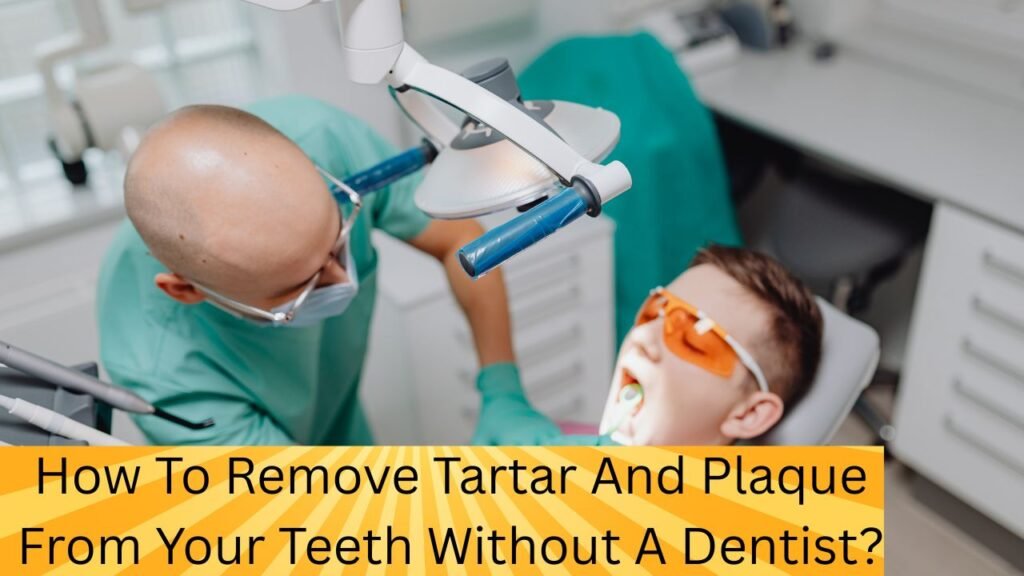Let’s get honest right out the gate:
✅ Plaque? You can remove it at home.
❌ Tartar (Calculus)? Not so much.
This guide is for people like you—living in the U.S., maybe busy, maybe uninsured, or just trying to stay ahead of dental issues without always running to the dentist. The good news? You can do a lot at home to remove plaque and prevent tartar buildup before it hardens. But once tartar forms, there’s no DIY trick that safely removes it. It’s bonded like cement to your enamel.
Here, you’ll learn:
- What works for removing plaque at home
- How to soften or slow tartar buildup
- What the American Dental Association (ADA) actually recommends
- The myths you should avoid
- Why dentist visits are still essential (even if you brush like a boss)

🦷 What’s the Difference Between Plaque and Tartar?
| Term | What It Is | Can You Remove at Home? |
|---|---|---|
| Plaque | Soft, sticky film of bacteria | ✅ Yes |
| Tartar | Hardened plaque (aka calculus) | ❌ No (needs a dentist) |
Think of plaque like wet mud on your shoes.
It’s easy to clean when it’s fresh. But if you let it dry and harden? That’s tartar. Now you need tools to chip it off—safely.
🪥 How to Remove Plaque at Home (And Prevent Tartar From Forming)
1. Brush Like You Mean It — But Gently
- Frequency: Twice a day, every day.
- Duration: 2 full minutes (set a timer!)
- ADA Tip: Use a soft-bristled toothbrush and fluoride toothpaste.
🔍 Why it matters: Brushing removes plaque before it hardens into tartar. ADA-approved fluoride strengthens enamel while pyrophosphates in tartar-control toothpaste help stop mineral buildup.
👉 Pro Tip: Use a circular motion, not just back-and-forth scrubbing. This helps get along the gumline where plaque loves to hide.
2. Floss — Yeah, Every Day
- Removes plaque between teeth your brush can’t reach.
- Prevents tartar from forming in tight spaces.
🧵 How-to:
- Wrap about 18 inches around your fingers.
- Gently guide between teeth.
- Hug each tooth in a “C” shape and slide down.
🦷 ADA studies show flossing daily reduces your chances of tartar by up to 40%. Don’t skip it.
3. Try Anti-Plaque Mouthwash (The Right Ones)
- Look for ones with chlorhexidine, essential oils, or cetylpyridinium chloride (CPC).
- These target bacterial colonies that fuel plaque formation.
🧪 Mechanism: Chlorhexidine disrupts bacteria walls. Essential oils penetrate plaque and reduce inflammation.
🔄 Use it: Once or twice daily after brushing and flossing.
🧼 Natural Home Remedies for Early Tartar Prevention
Some home remedies can help slow tartar formation or target very soft deposits. But they won’t replace a professional cleaning.
⚠️ Be cautious: Overuse can erode enamel or irritate gums.
🥄 Baking Soda Scrub (1–2x a week max)
- Mix 1 tsp of baking soda with a few drops of water to make a paste.
- Brush gently for 1 minute, then rinse.
✅ Pros: Neutralizes acids, mild abrasive for plaque.
❌ Cons: Too much can wear enamel.
🍎 Apple Cider Vinegar Rinse (Rare Use Only)
- Mix 1 tbsp with half a cup of water.
- Swish for 30 seconds, rinse with plain water after.
It might loosen some biofilm, but it’s acidic. Overuse can soften enamel and cause sensitivity.
🍊 Orange Peel Rub
- Rub the inside of an orange peel on your teeth.
- Let the vitamin C and oils sit briefly, then brush.
This one’s more folk wisdom than science, but it may mildly deter bacteria.
❌ Common Myths About Tartar Removal at Home
Let’s bust some bad advice:
- “Scraping with tools at home works.”
Nope. That damages enamel and gums. Hygienists use precision tools—not tweezers and nail files. - “Oil pulling removes tartar.”
It may reduce bacteria, but it doesn’t dissolve hardened tartar. - “Whitening strips remove buildup.”
They brighten stains, but don’t clean between teeth or below the gumline.
🛡️ Prevention Is the Real Power
Build a Routine That Keeps Tartar Away
| Habit | Frequency | Why It Helps |
|---|---|---|
| Brushing w/ Fluoride | 2x daily | Removes plaque, strengthens enamel |
| Flossing | 1x daily | Clears between teeth |
| Mouthwash (ADA-seal) | 1–2x daily | Fights bacteria |
| Dental Checkup | Every 6 months | Removes tartar, early problem check |
The ADA and CDC both say home care is essential, but professional cleanings are non-negotiable. Even if you follow every tip perfectly, tartar can still form in hard-to-reach areas.
🧑⚕️ Why Dentists Are Still Part of the Plan
Think of your oral hygiene like changing your car’s oil. You can maintain it, sure—but sometimes, it needs a mechanic. Same with your mouth.
Only a dental pro can:
- Remove hardened tartar (above and below gums)
- Detect cavities, gingivitis, and bone loss early
- Give your teeth a deep clean that home tools just can’t match
So even if you’re doing all the right things at home—don’t skip your regular visits.
conclusion:
Here’s the truth:
You can remove plaque and prevent tartar from forming at home.
You can’t remove hardened tartar without professional help.
But when you build smart habits—brushing, flossing, rinsing, and eating right—you’re already way ahead of the curve. Think of these home methods as your daily defense. But the dentist? That’s your backup shield.
Stay consistent. Stay cautious. And stay smiling.
Find Your Perfect Dentist
Easily book appointments with top-rated dentists in your area
Need Emergency Dental Care?
Get immediate help from verified dental professionals